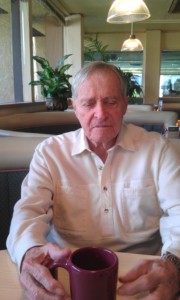David West Keirsey: Self Portrait
 (August 31, 1921 – July 30, 2013)
(August 31, 1921 – July 30, 2013)
My father died on July 30th, 2013 and I intend to honor him, if I can, by writing a blog about him and his ideas every year. First year. Second Year.
“I regard myself as the last living Gestalt Psychologist”
— David West Keirsey
Gestalt: German word for form or shape
He wrote a short autobiography at the bequest of us, it was titled: Turning Points. It chronicles some of the turning points of his life. I want to write “an intellectual history” of him using some of that material plus my fading memory about the ideas we discussed in those many years, since it might be instructive to see how and why his ideas were formed and evolved. Moreover, I think that his developed “methodology” of qualitative factor analysis and synthesis can contribute to the progress in science.
At very least it might help me, as an individual, to articulate the evolution of his ideas, in my quest to “understand the how and why the world works“: for his general approach to ideas (wholism: the gestalt) for a long time was the opposite of the way I approached ideas (atomistically). I posit that the ability to use and understand BOTH wholism (qualitative reasoning) and the atomistic (quantitative reasoning) approaches, in conjunction, will be the “middle way” to complexity science.
This garden universe vibrates complete,
Some, we get a sound so sweet.
Vibrations, reach on up to become light,
And then through gamma, out of sight.
Between the eyes and ears there lie,
The sounds of color and the light of a sigh.
And to hear the sun, what a thing to believe,
But it’s all around if we could but perceive.
To know ultra-violet, infra-red, and x-rays,
Beauty to find in so many ways.
Two notes of the chord, that’s our poor scope,
And to reach the chord is our life’s hope.
And to name the chord is important to some,
So they give it a word, and the word is OM.
The Word, Graeme Edge
In Search of the Lost Chord
Old man passing by, tell me what you sing.
Though your voice be faint, I am listening.
Voices in the Sky — Moody Blues
“I educated myself by reading books. Starting at age nine my family went to the library once a week, I checking out two or three novels which I would read during the week. Then, when I was sixteen, I read my father’s copy of Will Durant’s The Story of Philosophy. I read it over and over again, now and then re-reading his account of some of the philosophers.” — Turning Points (2013)
When I was young, my father would introduce and discuss, around the dinner table, the ideas of philosophers, scientists, and historians: like Oswald Spengler, Herbert Spencer, Will Durant, Charles Darwin, Adam Smith, William James, Arthur Schopenhauer, Ayn Rand, and Georg Hegel, to name a few.
“Bored with day labor, I returned to Junior College in September 1940 intending to become a high school English teacher. I became a scholar, one of three boys in the scholarship society in 1942. I took a course in word study. I have studied words ever since..” — Turning Points (2013)
He also talked about human action based on his experience as a kid and teenager in the Great Depression, as a fighter pilot in World War II, and counselor to troubled and troublesome kids as a school psychologist, and as a scholar who had read widely on the human condition. In short, he was personologist: a studier of persons: their actions and their words.
He had realized fairly early that many “so-called experts” were “faking it” — in particular he realized that the vast majority of so-called “mental illness” doctors (psychiatrists) would use their words to mask they didn’t know anything. He discovered the myth of “mental illness” even before Thomas Szasz articulated it.
Yet faith in false precision seems to us to be
one of the many imperfections
our species is cursed with.
— Dylan Grice
“Claremont Graduate University had a clinic in which I practiced counseling troubled persons for four years.
Pursuant to writing my masters thesis I studied ten persons said to have high blood pressure without physical disease or defect, then called “essential hypertension.” Met with each person many times for many months, using personality inventories and what was then called ‘associative anamnesis’ in which they told me the story of their lives while I asked them to go into more detail about their more disturbing experiences, taking copious notes all the while. No one had ever paid such rapt attention to them and tried so hard to understand how these experiences affected them, or accepted everything they said without criticism. It was on the basis of this method of interviewing that Carl Rogers built his notorious career, he giving the method names such as ‘non-directive counseling’, ‘reflective listening’, and ‘active listening’. Practicing the method early on and thenceforth gave direction to my career as a counselor of both troubled and troublesome children and their parents and teachers, and as a trainer of those who would practice such counseling, and finally as a writer on personality, counseling, and madness.
I found all ten persons to have the same personality, what I would much later call the Guardian. It was this long study of persons’ lives that set me on my lifelong career course. Thus I became a person watcher. Wrote Personality in Essential Hypertension for my MA degree.
In 1949 I interned at a fifty-inmate asylum for the so-called “insane”. There I met three psychiatrists. I was not only unimpressed with them, but appalled by them. They seemed ignorant of psychopathology and incompetent in psychotherapy. I and the other intern met with them each Saturday to discuss our findings on the inmates we had studied during the week. Each inmate that we had studied would appear before the three psychiatrists and the two interns. None of the three knew how to interview, glibly pronouncing each to be “schizophrenic.” Then came the weekly electro-convulsive “therapy”. All 50 inmates were in bed, 25 on one side of the room and 25 on the other side, each awaiting his turn to be zapped. This happened every Saturday for as long as each inmate was resident. Having studied the many varieties of madness since 1946 I was astonished that all inmates would be treated the same. Indeed, I was astonished that anyone would be so treated.” — Turning Points (2013)
He having studied words and studied what people actually do and say (both patients and psychiatrist jailers), he realized that medical community were hiding behind their Latin and Greek words (e.g., psych-osis, ano-rex-ia, bi-polar, cata-ton-ic, para-noi-a, schizo-phren-ic, dia-gno-sis, thera-py). When my father and I discussed ideas, my father made it a point to explain there is a difference between naming something and knowing something. Richard Feynman had a similiar experience with his father.
Melvin Feynman had not been able to pursue his own interest — science — because he never had the means to pay for advanced schooling. Luckily his son naturally had the same Temperament and interest, and Melvin got his wish that his son became a scientist.
Richard and Melvin were close, for they would take long walks and Melvin would talk to his son about the world. What Melvin did was to teach Richard to notice things.
‘He … taught me: “See that bird? Its a Spencer’s warbler.” (I knew he didn’t know the real name.) “Well, in Italian it’s Chutto Lapittitda. In Portuguese, it is Bom Da Peida. … You can know the name of the bird in all the languages of the world, but when you’re finished, you’ll know nothing whatsoever about the world. You’ll know about the humans in different places, and what they call the bird. So let’s look at the bird and see what it is doing — that’s what counts.” I learned very early from my father the difference between knowing the name of something and knowing something.’
My father was interested in understanding human action — he dwelled in “the soft sciences” (e.g., psychology, sociology, biology, economics), the realm of the qualitative. However, the soft sciences, trying hard to be “scientific” have used statistical reasoning as a significant technology in supporting it “as a science”. However, being highly educated in statistics (six semesters in graduate school), he realized that the fuzzy realm of statistics was also being used to fake understanding in the soft sciences. There is the old adage, “Lies, Damn Lies, and Statistics”.
The interesting thing to me was I also discovered that the realm of quantitative “hard sciences and mathematics” had a similar problem with statistics. And they have problems with their words.
Quantum mechanics, with its leap into statistics,
has been a mere palliative for our ignorance
— Rene Thom
Nobody understands Quantum Mechanics
— Richard Feynman
In mathematics you don’t understand things.
You just get used to them.
— John Von Neumann
The Qualitative is something that isn’t well handled by the so-called “hard sciences.” Scientific theories are created ad-hoc, built on top of previous concepts. Often the old guard of the established scientific consensus needs to die, before paradigm shifts can be accomplished.
The problem with “experts” is they think in grooves.
— Elaine Morgan
Being a “hard” science kind of guy by nature but always being questioned by my “Gestalt” psychologist father, I always, in the back of my mind, questioned the basic assumptions taught to me in school — like the physics concept of “mass.” As a young researcher, armed with my experience of things “digital,” I also began to be enamored with my own vision of the universe, I grew to love all of conventional science, computer science, and mathematics. I still do. But I finally pinpointed the “flaw” when I discovered Robert Rosen‘s rigorous explanation of what “really” my father was trying to tell me. Science often gets confused and impressed by its own words and models.
In the future I will be using my father’s Hegelian primary factor qualitative reasoning AND a new-old information science quantitative reasoning WITH careful observing, and comparing: in the form what might be called Relational Science and Comparative Complexity.
A kind of a turning point, I hope.
The progress of science is the discovery at each step of a new order
which gives unity to what had seemed unlike.
— Jacob Bronowski
Dr. David West Keirsey and Dr. David Mark Keirsey blogs on Human Action

